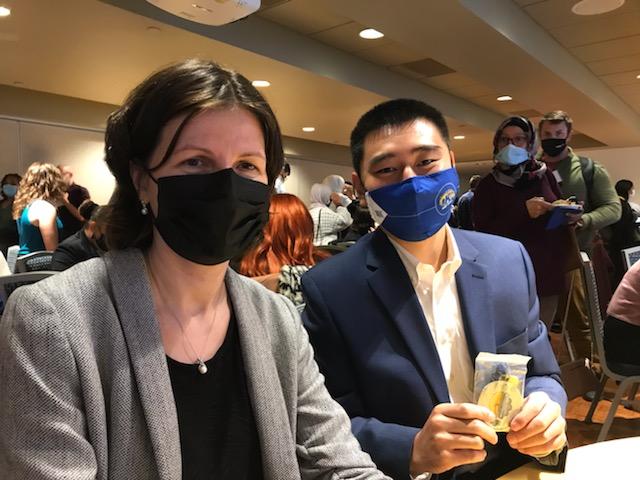What if there was one overlooked vitamin found in common foods that could potentially help prevent or treat serious diseases including arthritis, cancer, osteoporosis, diabetes, cardiovascular disease, kidney disease, diabetes, neurological diseases, and even protect against severe COVID-19 infections?
According to one undergraduate research student and his professor, preliminary research suggests there may be one!
For eight weeks last summer, Daniela Popescu, Ph.D., Associate Professor in the Department of Biological Sciences at ¬ť∂Ļĺę—° Geauga and Twinsburg Academic Center, served as a mentor to undergraduate nursing student Wayne Nieh. His research project, "A Review Study of Vitamin K, the Forgotten Vitamin,‚ÄĚ was part of the 2021 Summer Undergraduate Research Experience (SURE) program at ¬ť∂Ļĺę—°.
Wayne is a second-year Bachelor of Science in Nursing (BSN) student at ¬ť∂Ļĺę—°Geauga. After earning his bachelor‚Äôs degree, he plans on working as a nurse to serve the elderly population in urban communities.
After gaining professional nursing experience, Wayne says, ‚ÄúI am dedicated to furthering my education by pursuing a master‚Äôs degree or Ph.D. in nursing, as I am committed to continued learning, in hopes of reducing healthcare disparities.‚ÄĚ
Wayne became a student of Dr. Popescu when he took her Anatomy and Physiology I course (BSCI 21010) in August 2020, then subsequently, her Anatomy and Physiology II course.
‚ÄúFrom the beginning, Wayne impressed me as a bright, very hard-working, and diligent student,‚ÄĚ says Dr. Popescu. ‚ÄúDuring the Anatomy and Physiology courses, he always asked very good questions that reflected his curiosity and passion for human anatomy and physiology, and his critical thinking. His abilities, achievements, and interest in learning did set him apart as the ideal candidate for my project.‚ÄĚ

Wayne’s SURE project built upon Dr. Popescu’s research. His goals were to examine current scientific literature to explore the roles of vitamin K in human health, and to study vitamin K’s mechanisms of action. While its main function is in blood coagulation, Wayne’s inquiry revealed the vitamin’s anti-inflammatory potential.
Despite the challenges brought about by the pandemic, Wayne successfully carried out his SURE research project remotely and learned new skills along the way. He and his mentor met only once in person, but they communicated regularly via Zoom technology. Dr. Popescu also trained Wayne remotely to use digital tools to conduct his research, effectively searching and critically analyzing reputable, peer-reviewed literature.
Wayne used the Medical Subject Headings Database in PubMed to search for relevant scientific articles published within the past 10-20 years, evaluating the impact of vitamin K in human health. He also used Zotero software to collect and organize the articles.
As a result, Wayne says, “This summer research project helped me realize that vitamin K may play essential roles in preventing or treating various diseases, including arthritis, cancer, osteoporosis, diabetes, cardiovascular disease, chronic kidney disease, neurological diseases, and COVID-19 infections.
‚ÄúSome of these diseases are age-related diseases, and therefore, vitamin K2 could lower the costs of modern health care and improve the quality of life. Thus, it is crucial to understand the health benefits of vitamin K and its mechanisms of action.‚ÄĚ
Dr. Popescu adds, “More specifically, by searching the literature, Wayne found peer-reviewed studies (performed in vitro or/and in vivo) which were showing that in addition to its important role in blood coagulation, Vitamin K may potentially have anti-inflammatory effects in rheumatoid arthritis and osteoarthritis, anti-cancer effects by fighting against colon, breast, prostate and liver cancers, and studies showing that vitamin K enhances insulin sensitivity.
‚ÄúHe also found studies showing that vitamin K may support bone health, cardiovascular health by reducing vascular calcifications, may support kidney health and brain health, and may protect against severe COVID-19 disease by exhibiting anti-inflammatory effects. We need to keep in mind though, that these are preliminary studies and some of these studies were performed on cells or in animals, and therefore, further research is needed to confirm these data.‚ÄĚ
Wayne shared his research data in a three-minute presentation at ¬ť∂Ļĺę—°‚Äôs 2021 SURE competition in October 2021. He will also make a poster presentation in April at Kent State‚Äôs 2022 Undergraduate Symposium on Research, Scholarship and Endeavors. Further, he and Dr. Popescu will incorporate the data into a vitamin K review article they will write and submit to a peer-reviewed journal.
While all of this preliminary research shows promise, the potential beneficial roles of vitamin K in humans requires further investigation. Dr. Popescu explains that humans depend on dietary sources for the required daily allowance of fat-soluble vitamin K, which nature provides in two forms, vitamin K1 and vitamin K2. The main food sources of vitamin K1 are dark green leafy vegetables (kale, broccoli, collards, spinach, etc.), whereas vitamin K2 is found in fermented foods, hard cheeses, eggs and meats. "Good" bacteria in the large intestine also produce vitamin K2. Oral supplements are available on the market (vitamin K2), but the best way to maintain an optimal level of vitamin K is through a healthy diet.
Also, while there is no routine blood test that can detect individual vitamin K levels, Dr. Popescu says a deficiency of this vitamin is uncommon in healthy adults with a healthy diet. Deficiencies are usually associated with specific conditions such as the long-term use of oral antibiotics (which can decrease the population of vitamin K-producing bacteria in the large intestine), malabsorption disorders, drug interactions, or an extremely poor diet lacking vitamin K.
Wayne says that his SURE experience showed him the power of research in health care and also trained his critical thinking and analysis skills, which will help him significantly in his future career.
‚ÄúAfter learning about the potential health benefits of vitamin K, I am eager to apply these skills that I learned from the research experience in the upcoming nursing courses/clinicals in the spring semester,‚ÄĚ he says. ‚ÄúI hope to continue to participate in research since research in nursing keeps nursing practice effective and safe, which ultimately improves the patients‚Äô health and their quality of life.‚ÄĚ
